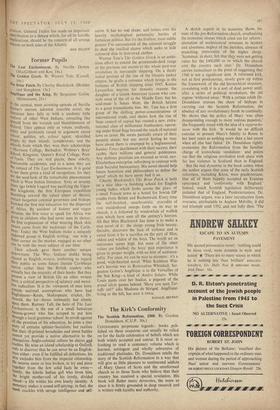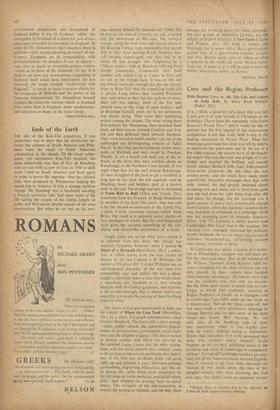The Kirk's Conformity
The Scottish Reformation, 1560. By Gordon Donaldson. (C.U.P.. 30s.) CENTENARIES perpetuate legends : books pub- lished on these occasions can usually be relied on for the facile celebration of beliefs which are both widely accepted and untrue. It is most re- freshing to read a centenary volume which is learned, astringent and wholly subversive of traditional platitudes. Dr. Donaldson retells the story of the Scottish Reformation in a way that will give as little pleasure to sentimental addicts of Mary Queen of Scots and the unreformed church as to those Scots who believe that their country has received a special revelation. His book will flutter many dovecotes, the more so since it is firmly grounded in deep research and is written with lucidity and authority. A sketch superb in its economy shows the state of the pre-Reformation church, emphasising the economic abuses which cried out for reform : alienation of ecclesiastical revenues to laymen and absentees, neglect of the parishes, absence of preaching. immorality of the higher clergy. 'Scotsmen, in short, felt that they were not getting value for the £400,000 or so which the church cost the country each year.' Dr. Donaldson carries iconoclasm to the point of suggesting that 1560 is not a significant date. A reformed kirk, not at first presbyterian, slowly grew up within the framework of the old hierarchical structure, co-existing with it in a sort of dual power until, after a series of political revolutions, the old regime 'withered away.' With a certain relish Dr. Donaldson stresses the share of bishops in carrying out the Scottish Reformation, the absence of any revolutionary break in continuity. He shows that the policy of Mary 'was often disappointing enough to more zealous papalists.' She frequently toyed with the idea of a rapproche- ment with the kirk. 'It would be no difficult exercise to present Mary's fidelity to Rome in her later years as nothing more than a last resort when all else had failed.' Dr. Donaldson rightly exonerates the Reformation from the familiar charge of iconoclastic vandalism : and points out that the religious revolution took place with far less violence in Scotland than in England.
But the real dynamite in the book comes when the author argues that none of the early Scottish reformers, including Knox, were presbyterians; that all of them happily accepted an Erastian episcopacy and 'conformity with England.' Indeed, much Scottish legislation deliberately imitated that of England. Presbyterianism, Dr. Donaldson argues, was a later introduction from overseas, attributable to Andrew Melville; it did not triumph until 1592, and not fully then. 'The
presbyterian programme was formulated in England before it was 'in Scotland,' whilst 'the emergence in Scotland of a claim for jure divino episcopacy preceded its emergence in England.' In some of Dr. Donaldson's later chapters there is perhaps a little special pleading on behalf of epi- scopacy. Emphasis on its compatibility with presbyterianism--in practice if not in theory— may owe as much to twentieth-century contro- versies as to those of the sixteenth. To say 'it is hard to see how any development originating in Scotland itself could have interrupted, far less reversed, the trend towards "conformity with England,"' is surely to make excessive claims for the eloquence of Melville and the power of the Genevan International. Dr. Donaldson himself exposes the economic reasons which, in Scotland even more than in England, made presbyterian- ism attractive to many of the lesser clergy.
CHRISTOPHER HILL







































 Previous page
Previous page